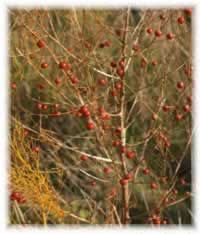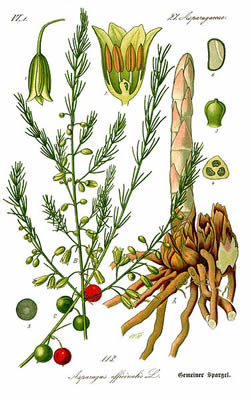Asparagus Asparagus spp

wild asparagus
- Common Names
- Asparagus , Satavari
- Botanical Name
- Asparagus spp
- Family
- LILIACEAE
Medicinal Uses & Benefits of Asparagus
![]() How to Use|
Side Effects |
Plant & Garden|
How to Use|
Side Effects |
Plant & Garden|
- Medicinal Uses: * Aphrodisiac
* Ayurvedic
* Culinary/Kitchen
* Female Hormones
* Kidney
* Spring Tonics
- Properties: * Aphrodisiac * Depurative * Diuretic * Hypotensive * Laxative * Refrigerant
- Parts Used: rhizome, stem
- Constituents: steroidal saponins & glycosides (shatavarin, sarasapogenin, diosgenin), isoflavones, mucilage, alkaloids, asparagamine, sistosterol.
How to Use: Asparagus
There are over 300 species in the asparagus family, many are used medicinally, grown as ornaments or eaten as vegetables. The most well-known species, Asparagus officinalis, is what we commonly refer to as asparagus, whose tasty green stalks are one the most nutritious of the early green vegetables in the spring garden. Like tomatoes, it is high is lycopene, a powerful antioxidant that is protective against many degenerative diseases and cancers. The viamin A content is important for eye health and the fibrous stalks help to reduce cholesterol. Asparagus is also a useful diuretic and mild laxative.
Asparagus racemosus is the species used in India for medicinal purposes.
Preparation Methods & Dosage :The powdered root is made into teas and tinctures. The fresh shoots are a healthy spring vegetable.
Ayurvedic Medicine
 Known in India as Shatavari, asparagus has been a treatment for infertility and lack of libido in women for thousands of years, and is regarded as one of the most important herbal tonics for women.
Known in India as Shatavari, asparagus has been a treatment for infertility and lack of libido in women for thousands of years, and is regarded as one of the most important herbal tonics for women.
Asparagus Side Effects: Consult with a physician before using if pregnant or nursing
Plant Description
- Plant Class: Herbaceous Perennial
- Flowers/Fruit/Seeds:Bell shaped, greenish-white flowers, usually dioecious, with both male and female flowers on the same plant. The small, red berry that follows is poisonous to humans.
- Parts used: Fresh shoots, root
- Leaves:Stout stems, tall, feathery foliage. The leaves are not true leaves, but modified stems that grow in clusters of 4 -15
- Flowering Season:
- Distribution:Asparagus officinalis is native to most of Europe, northern Africa and western Asia, found in all of North America and cultivated worldwide.
Regional Traditions :Ayurvedic *
History and Traditions & Folklore
It appears to have been cultivated in the time of Cato the Elder, 200 years B.C., and Pliny mentions a species that grew near Ravenna, of which three heads would weigh a pound. Asparagus is noticed by Gerard in 1597, and in 1670 forced Asparagus was supplied to the London market.. 2
The name Shatavari, referring to the species used in Ayurvedic medicine is Asparagus racemosus, is from an Indian word meaning "a woman who has a hundred husbands".
- Wikipedia

- Grieve, Maud Mrs. "A Modern Herbal" (1931)
The virtues of Asparagus are well known as a diuretic and laxative; and for those of sedentary habits who suffer from symptoms of gravel, it has been found very beneficial, as well as in cases of dropsy. The fresh expressed juice is taken medicinally in tablespoonful doses












